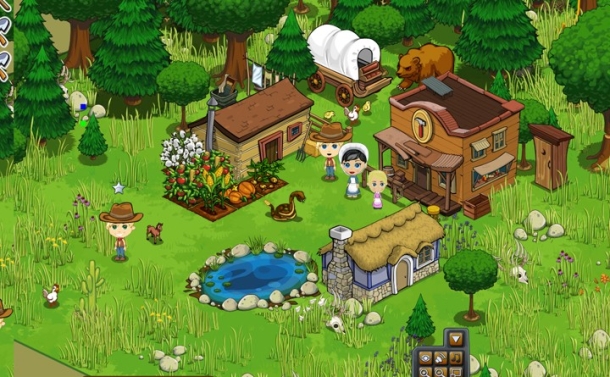Farmers become cowboys

The largest developer of games on social networks, the company Zynga , the author of one of the most popular games on Facebook, FarmVille (which spawned the popular Russian counterpart — Happy Farmer and many other games), released a new hit that is rapidly gaining popularity.
The game FrontierVille, was released on the expanses of social networks only on June 9, 2010, but already now more than 5 million Facebook users play it actively every day. According to the developers, more money was spent on this project than on any other product of the company, and high hopes are placed on it.

The name of the game can be translated as “Compound” or “Settlers”. In fact - this is the same "Farm" in the scenery of the Wild West, which has absorbed all the most interesting of the other games of the company. A player can follow in the footsteps of the settler pioneers in the Wild West: get a plot of land, farm, cut down forest, seize and clear territories, build buildings, grow cattle and plants, harvest crops, play weddings, continue the race. The developers have added a few arcade elements inherent in the usual casual games, when you have to click a lot with the mouse and get different bonuses for it. But the emphasis is still on social interaction: in order to succeed, the player is interested in attracting more friends to his plot and visiting the farmsteads of others himself, helping each other set up plots and develop farms.
')

Mark Pincus, CEO of Zynga, did not hide his admiration, recognizing the launch of FrontierVille “the most successful of all”. To date, more than 10 million people have already created virtual sites that can be developed to cities, half a million people have played virtual weddings, 5 million settlers have visited their friends (and completed more than 550 million different jobs), 2.5 million players have hired their friends for performing tasks in a virtual farm.
But while some enjoy virtual entertainment, others get very real profits. According to some reports, in 2010 alone, Zynga earned more than $ 600 million in its games. And a significant part of the money (about 90%), the company receives from the players, selling them virtual property, with which you can achieve success in the game much faster.
Games in social networks have grown from the arcades of the 80s (Pacman, Asteroids), attracting with its simplicity. The person easily got into the game, paid for the start, but during the game the virtual “lives” ended, and in order to go further, the developers provided an opportunity to pay more so as not to start all over again.
Start playing any of the modern social games is even easier. Any user of a social network from a child to an elderly person can easily start the game. But now you can not waste time on the passage of levels - the developers provide an opportunity for players at any time to “simplify their lives” and get a significant advantage, passing some routine tasks or simplifying their implementation - just by paying.
For example, in the previous hit of the company Zynga - FishVille, the object of the game is a virtual aquarium, which can be filled with fish and beautiful decorations. The player spends virtual money in order to buy virtual fish at a small price, develop them in his aquarium, spend a few real hours or days, and then sell them more expensive than he paid at the beginning. The player earns virtual money again to buy more fish. At the same time, he can buy for real money a certain amount of virtual money in order to speed up the process of passing. And this is just one of many options that vary from game to game. Thus, players buy virtual goods, exchange real money for virtual money, and all in order to achieve success in their favorite game, and at the same time surpass their friends and acquaintances. And developers get super profits, happy to provide players with new opportunities for real money.
Zynga plans to further develop the social aspect in all their games, and are confident that soon all their games will function as virtual economies with points of trade centered around industries. And where trade and markets develop, there are more reasons for communication, on the one hand, and the possibility of making good money on the other. Everything is the same as in the real world.
Source: https://habr.com/ru/post/97214/
All Articles